Wireless MAXg Range Extender (USR5441)
Installation
You must be using a wireless router or access point that supports WDS (Wireless
Distribution System). If you are using WPA as an encryption method in your wireless
network, you must be using either TKIP or AES, not a combination, since the
Range Extender only supports one or the other. The Range Extender also does
not support WPA2 or WPA/WPA2 with RADIUS 802.1x authentication.
You must have administrator rights on your computer in order to install this
product.
Be sure to find out what letter your CD-ROM drive uses before you begin installing
your new product. You will need to know this to install your software.
Note: For the most updated information, visit: http://www.usr.com/support
You can also refer to the User Guide on the USRobotics Installation CD-ROM
for more detailed information.
Step One: Connect the Wireless MAXg Range Extender
Note: Look at the label on the bottom of the Wireless MAXg Range Extender and write down the WLAN and the LAN MAC addresses listed before you physically
place the Range Extender. You will need these for future reference.
- Connect the antenna to the Wireless MAXg Range Extender.
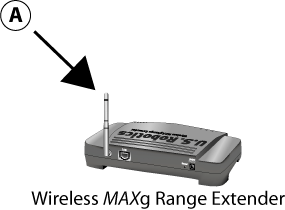
- Connect the supplied Ethernet cable to the LAN port of the Wireless MAXg
Range Extender and to a LAN port on a networking device, such as a router.

- Connect the power adapter to the Wireless MAXg Range Extender and
to a standard wall power outlet.
Note to UK Users: Attach the correct power plug to the power adapter.

Step Two: Locate the Range Extender in your network
Note: It is recommended that the Wireless MAXg Range Extender
is always configured via an Ethernet connection. This will ensure the configuration
changes are made without modifying the properties of any wireless cards in your
network.
Windows Users
- Insert your USRobotics Installation CD-ROM into the CD-ROM drive of a
computer connected to the existing router. The Installation CD User Interface
will appear on your screen. If prompted, select your preferred language. Follow
the on-screen instructions to install and open the Detection Utility.
Note: If your CD-ROM does not automatically launch, click Windows Start,
Run, type D:\setup (or the appropriate letter of your CD-ROM drive),
and click OK.
- Click Next when the Detection Utility opens.
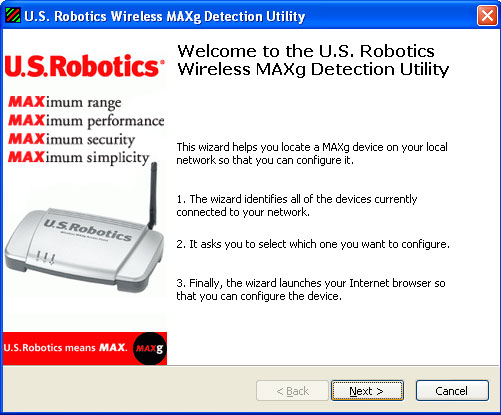
Note: If you have multiple network adapters connected to the computer
on which you are running the Detection Utility, you will need to select the
adapter that is connected to the wireless network. Click Next.
- After the devices on your network are detected, determine which is your
Range Extender by matching the LAN MAC addresses. The LAN MAC address of the
Range Extender is located on the label on the bottom of the Range Extender.
If you do not see the LAN MAC address for your Range Extender, make sure it
is connected properly and click Detect to scan your network again.
Select the LAN MAC address for your Range Extender and click Next.
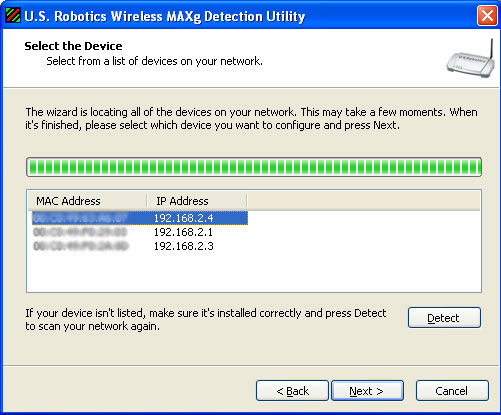
- Click Finish to exit the Detection Utility and to open the Web User
Interface in a new browser window.
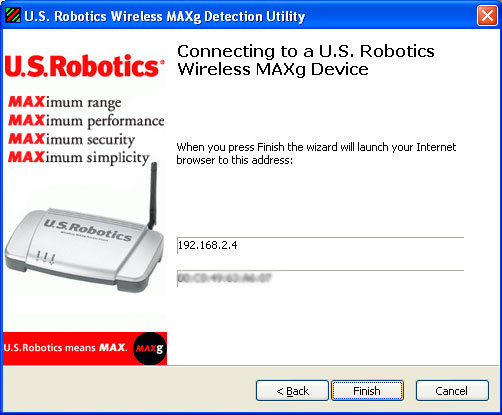
Macintosh and Linux Users
- The networking device that the Range Extender is connected to probably has
some form of Web User Interface where you can view a client list. Refer to
your networking device's documentation to determine how to view this information.
- When you find the client list, locate the Range Extender. You can do this
by verifying the LAN MAC address that is on the bottom label of the Range
Extender and what appears in the client list. Write down the IP address of
the Range Extender for future reference.
- Open a Web browser, type in the IP address of the Range Extender, and then
press Enter. This will open the Web User Interface of the Range Extender.
If you cannot connect to the Range Extender, make sure all the connections
are secure and correct.
Step Three: Configure the Wireless MAXg Range Extender
- Click Start to begin the Setup Wizard procedure.
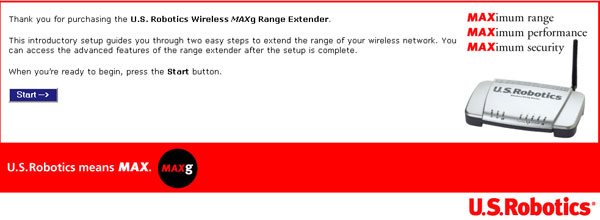
- On this page you can select the Network Name (SSID) of the wireless network
device to which you will be connecting the Range Extender. If you do not see
the Network Name (SSID) of the appropriate wireless network device, click
Scan to search the area again.
Note: When you select a wireless router or access point to which you
want to connect, make sure you choose one that supports WDS.
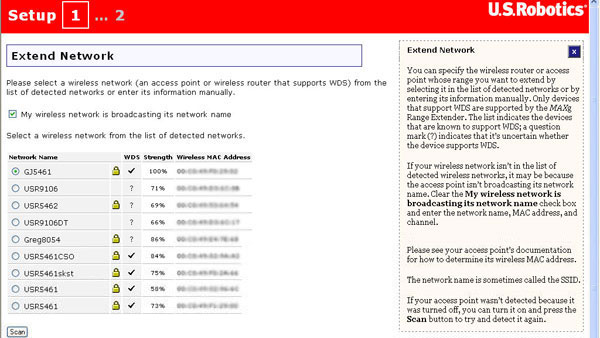
If the appropriate network device does not appear or if that device is not
broadcasting its Network Name (SSID), deselect the My wireless network
is broadcasting its network name checkbox and manually enter the information
for the network device. You will need to enter the network name, the wireless
MAC address, and the correct channel of the existing wireless network.
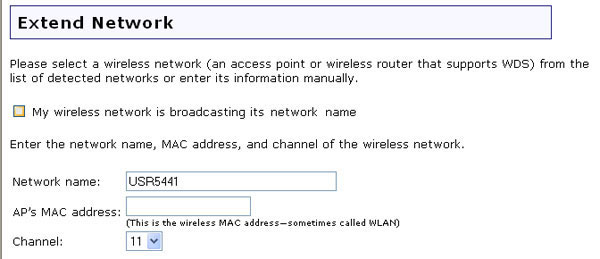
- Next, you will need to select the security Method and the Pass
phrase or the Key (depending on if you selected WPA PSK or WEP).
These settings must match the security information of the wireless network
device to which you are connecting the Range Extender. The Range Extender
does not support WPA2 PSK or WPA/WPA2 with RADIUS 802.1x authentication. When
you are finished, click Next.

Note: If the range extender is unable to determine whether or not security
is enabled on the wireless network device to which you will be connecting,
you will need to manually make a choice:
- If you know that security is enabled, make sure the I am connecting to
a secure wireless network checkbox is selected, enter the appropriate
information, and click Next.
- If you know that security is not enabled, deselect the I am connecting
to a secure wireless network checkbox and click Next.

- On this page you will need to create a User name and a Password
for login purposes to the Wireless MAXg Range Extender. These fields
are case-sensitive. When you are done, click Finish.
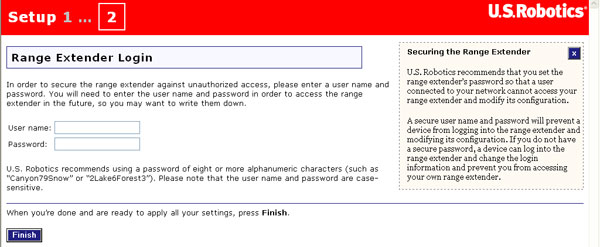
- Click Continue to go to the Web User Interface of the Range Extender.

You will be prompted to enter the user name and password you just created
in order to access the Web User Interface of the Range Extender.
Note: After you have completed the installation and configuration procedures,
it is recommended that you create a backup file of your settings in case you
ever experience some difficulties and want to restore your settings. Click the
Device tab and then click Back Up in the Back Up Settings section.
Refer to the Device section in the
Web User Interface chapter of this guide for more information about this feature.
Step Four: Reposition the Wireless MAXg Range Extender
You can now move the Wireless MAXg Range Extender to a different location
to use its wireless capabilities. Disconnect the Ethernet cable and the power
adapter of the Wireless MAXg Range Extender. Position the Range Extender
within the coverage area of your wireless router or access point and plug in
the power adapter. The Range Extender should now establish a wireless connection
to your wireless router or access point.
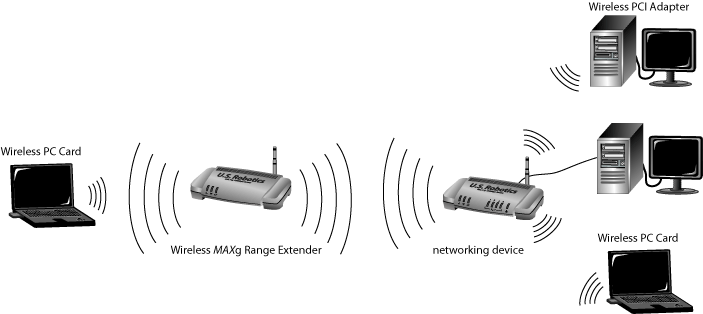
Congratulations!
You have finished installing your hardware and the necessary software. Your
Wireless MAXg Range Extender provides wireless clients with the ability
to connect to a wireless network that was previously too far away to establish
a connection. For troubleshooting and technical support information, refer to
the "Troubleshooting" section
of this guide for more detailed information.
Register your product
Register your product online at http://www.usr.com/productreg
















